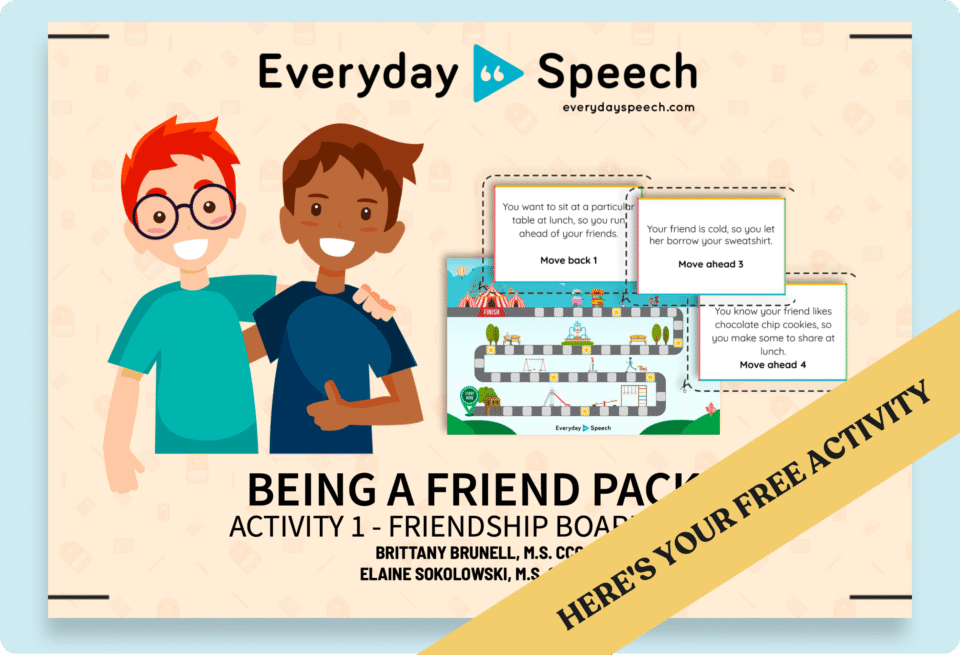Free Middle School Self-Esteem Poster: Strategies to Build Confidence
Get free social skills materials
No-prep lessons on self-regulation, emotional recognition, conversation skills, and more.
Sign up hereMiddle school is one of the most formative stages for shaping how students see themselves. Every interaction, success, and setback influences how they think about their value—and whether they believe they’re capable of growth.
The Building Confidence goal poster from Everyday Speech introduces five practical strategies to support self-esteem development in middle schoolers. It’s a free printable resource that reinforces key habits like persistence, self-compassion, and positive self-talk.
In this article, we’ll cover:
- Why self-esteem work matters in middle school
- What’s included in the poster
- A step-by-step plan for introducing it in your classroom
- A free download to get started today
Download 30+ Printable Social Skills Posters
Ready-to-use visuals for emotional regulation, self-advocacy, and more
Why Teach Self-Esteem in Middle School?
Students in grades 6–8 are especially vulnerable to negative self-talk and low self-confidence. They are beginning to compare themselves more deeply to peers, test out new identities, and become increasingly sensitive to judgment and failure.
Without tools to support self-worth, students may:
- Avoid challenges for fear of failure
- Dismiss their achievements or strengths
- Internalize mistakes as personal flaws
- Struggle to recover from setbacks
Teaching self-esteem means teaching students how to build themselves back up. It’s about helping them develop the habits and internal scripts that allow them to try, reflect, and try again.
This poster offers a visual, accessible way to bring that message into everyday routines.
What’s Included in the Self-Esteem Poster?
The Building Confidence poster includes five core strategies for strengthening self-worth:
- Speak up for yourself
- Use positive self-talk
- Have self-compassion
- Practice persistence—be your own cheerleader
- Give yourself opportunities to succeed
These strategies are written in student-friendly language and designed to be immediately applicable. Whether students are preparing for a big test, navigating a social situation, or facing an everyday challenge, these reminders help reinforce a confident mindset.
Download Self-Esteem Activities for Teens
No-prep worksheets to build confidence, reflection, and independence.
How to Use the Poster in Your Classroom
Here’s a quick and effective way to turn this poster into an interactive lesson:
1. Introduce the concept of self-esteem
Start with a brief discussion:
- What does self-esteem mean?
- How do you know when someone has confidence in themselves?
- Can you think of a time when you felt proud of yourself, even if something was hard?
Explain that self-esteem isn’t about thinking you’re perfect. It’s about believing in your ability to grow, bounce back, and be kind to yourself in the process.
2. Lead a self-reflection activity
Have students write down three to five things they’re proud of, or traits they love about themselves. Ask follow-up questions like:
- Why do you value this about yourself?
- How does this strength help you in everyday life?
This sets the tone for a strengths-based conversation and encourages students to name and claim their value.
3. Introduce the poster and unpack the strategies
Display the Building Confidence poster and walk through each strategy one by one. You might ask:
- What does “positive self-talk” sound like in your head?
- Why is it hard to speak up sometimes?
- How can we give ourselves opportunities to succeed?
Make it personal. Encourage students to connect each strategy to something real in their lives.
4. Reinforce the message visually
Keep the poster up in your classroom or share it as a handout for students to keep in their binders. You can also turn it into a goal-setting worksheet by asking students to pick one strategy to focus on each week.
Why We Recommend This Resource
This poster supports middle school students by:
- Offering a clear, simple framework for confidence-building
- Encouraging self-reflection and emotional awareness
- Normalizing the process of learning from failure
- Helping students reframe challenges as growth opportunities
Whether you’re using it during a small group session, a morning meeting, or a health or advisory class, this resource provides a positive, student-centered starting point.
Want More? Access Additional Free Resources!
Everyday Speech is a no-prep digital curriculum that combines evidence-based video modeling, interactive web games, and digital and printable worksheets to make teaching social skills easy.
We offer a free 30-day trial where you can use our thousands of video lessons, worksheets, and games to teach social skills like self-esteem.
Here’s an example video modeling lesson for teaching self-esteem from our curriculum:

